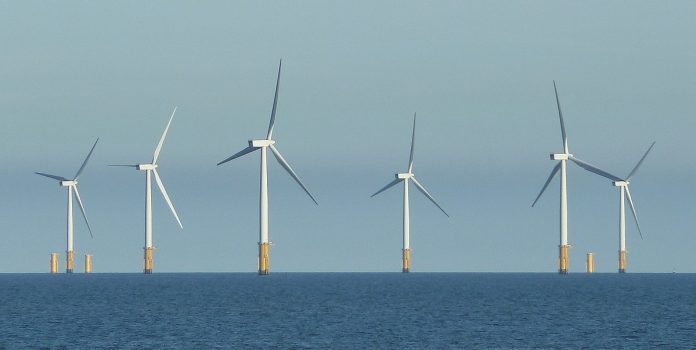Saying she’d heard the concerns of Maine’s commercial fisheries and lobstermen, Gov. Janet Mills signed legislation permanently banning offshore wind turbines within Maine’s 3-mile-limit for the offshore waters under the state’s legal jurisdiction.
The law, signed by Mills on July 7, also creates an Offshore Wind Research Commission (OWRC) within the Governor’s Energy Office to plan and coordinate a “research array” of a dozen or so offshore turbines linked to onshore transmission facilities.
Mills has been a staunch advocate for the wind industry.
Last November she announced a plan to create the nation’s first floating offshore wind array in the Gulf of Maine. The goal, she stated, was to solidify Maine’s leadership in deep-water offshore wind and to collaborate with Maine’s fisheries, which generated over half a billion dollars in revenues even in COVID-plagued 2020, on wind industry development.
Funding for that project came from a $2 million U.S. Economic Development Agency (EDA) grant.
Offshore Wind Troubles Fisheries
Many representatives of Maine’s fisheries and lobstermen, including the Cranberry Isles Fishermen’s Co-op and the Lobster Advisory Council, say wind farms could destroy the commercial sea-food production industry in the state.
To support this claim in their case before Mills, they cited a U.S. Army Corps of Engineers review of a nearby offshore wind project that concluded commercial fisheries would likely have to abandon the entire project area due to difficulties with navigation.
The group Protect the Gulf of Maine (PGM) was established specifically to fight all wind farms off Maine’s coast. They say the Gulf of Maine is “the breadbasket of the Atlantic,” home to one of the world’s most biologically productive marine ecosystems.
Protect the Gulf of Maine points to research indicating offshore wind farms could devastate more than 3,000 marine and bird species that call the kelp beds, salt marshes, seagrass beds, tidal mudflats, and underwater rocky outcrops in the Gulf of Maine home.
Responding to these concerns, Mills suggested Maine take a go-slow approach for offshore wind, proposing a research array of 12 to 16 turbines 20 to 40 miles from shore.
Even this soft approach did not fully appease Maine fisheries. The Lobster Advisory Council voted unanimously to oppose all offshore wind farms as a threat to the state’s fisheries.
State Water’s Ban Insufficient
To appease fishing and lobstering interests, Mills, whose initial bill had included a 10-year moratorium on offshore wind in state waters, agreed to make the ban permanent, but just in state waters, not the entire gulf.
The EDA grant requires the OWRC to propose a strategy to guide research project development by March 2023.
Under pressure from Maine’s commercial fishing industry, the OWRC’s advisory board included representatives of the lobster industry, other commercial fishermen, and the recreational charter fishing industry, as well as energy experts.
A draft version of OWRC’s Maine Offshore Wind Roadmap was released on July 14.
Even before its release, however, turbines for the research array were already being developed by the University of Maine and a public-private partnership known as New England Aqua Ventus, and Maine announced plans to file its application to the federal Bureau of Ocean Energy Management for the research array, after a month-long public comment period.
The speed at which the state moving forward has left PGM concerned the application will be filed long before OWRC’s roadmap – which they say is crucial to the health of Maine communities – is completed.
The wind industry will be a good partner to Maine’s commercial fishing industry, Mills assured the public in a statement upon signing the legislation.
“Maine is uniquely prepared to grow a strong offshore wind industry, create good-paying trades and technology jobs around the state, and reduce our crippling dependence on harmful fossil fuels,” Mills said. “[T]his bill … demonstrates that offshore wind and Maine’s fishing industry can not only can coexist but can help us build a stronger economy with more good-paying jobs and a brighter, more sustainable future for Maine people.”
Fisheries will continue to fight for their livelihoods
While thanking the hospitality industry and others for their help in securing the permanent ban on offshore wind in state waters, Jessica Hathaway, editor in chief of the Portland, Maine-based National Fisherman, says she remains skeptical whether wind and fisheries can share the ocean. She also lamented that fact that fisheries lack a strong national organization protecting their interests in both state legislatures and in Washington, D.C.
“It remains to be seen whether an offshore wind industry and fisheries can coexist because the technology is changing rapidly, and what we’ve seen in Europe does not bode well for fisheries,” Hathaway said. “Small test sites are the only acceptable approach at this time, because they allow us to see the possibilities of wind power generation as well as effects on fisheries and essential fish habitat without coast-wide disruption.
“Fishermen and fisheries associations should be at the table for every discussion of offshore wind, not just at statehouses but at the federal level,” said Hathaway. “Offshore lobster and other fisheries deserve the same protections as the inshore fleet, and since, at best, only 5 to 10 percent of the ocean is productive fishing ground, when regulators chip away at that with rolling area closures and gear closures, federal marine protected areas, industrial aquaculture, and now wide-scale investments in offshore wind, the collective result is bigger impediments to the future of sustainable wild fisheries.”
Duggan Flanakin (dflanakin@gmail.com) writes from Austin, Texas.


























